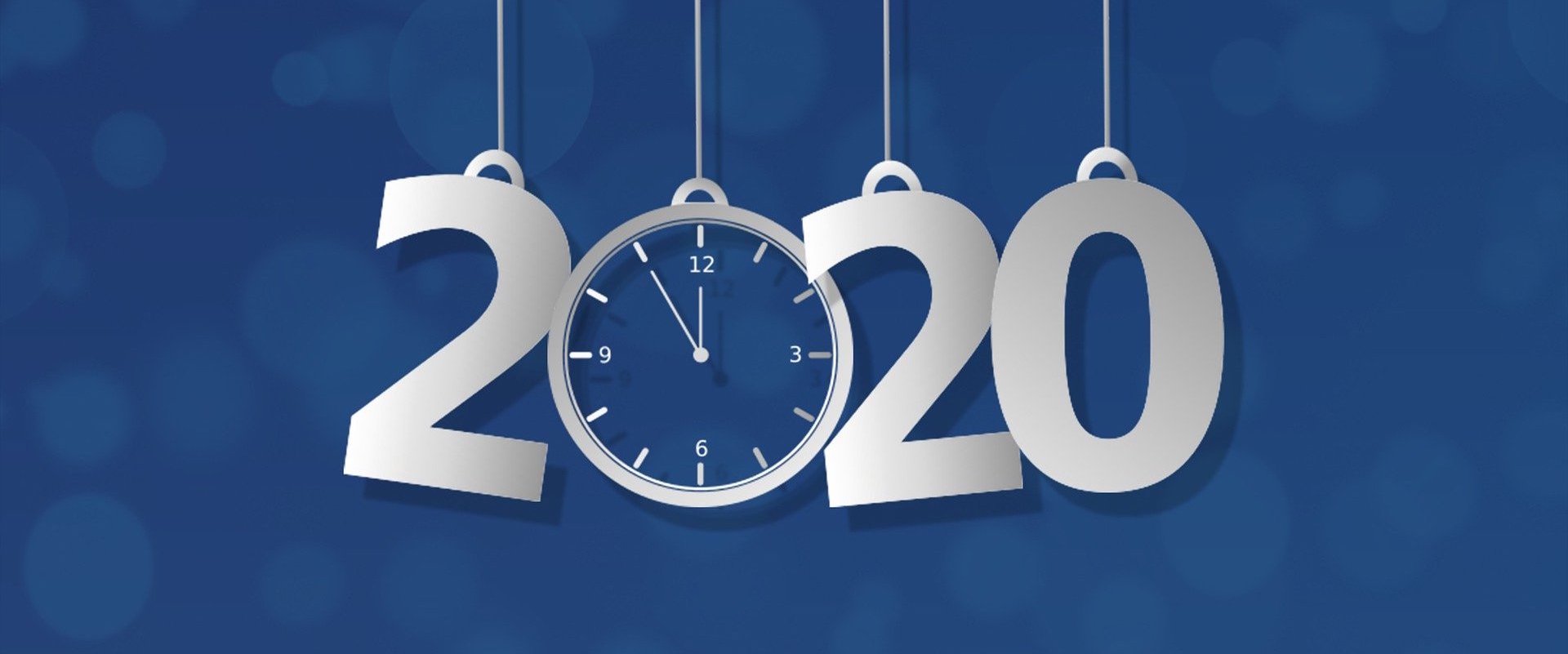Recent high-profile court cases have put compliance management back in the spotlight in the world of procurement. This, as well as the growing pressure to cut costs across the supply chain, has presented unique but not impossible challenges to overcome.
So, what can procurement expect to come up on the agenda in 2020 when it comes to Australia's compliance landscape?
Safety first
The first prosecution under Queensland’s new industrial manslaughter laws this year is a reminder for organisations that due diligence should never be compromised. Following a worker’s death on site, the prosecuted business could face fines of up to $10 million, and its directors could face up to 20 years in prison.
The Queensland Government will also extend its industrial manslaughter law to cover the mining industry in response to mounting pressure from the public. Given the prevalence of contract labour in the resources sector, we may see future amendments that affect those further up the chain, i.e. the mining companies themselves.
Meanwhile, Victoria has also recently passed its workplace manslaughter legislation which imposes the highest fines nation-wide and covers death of members of the public as well. Who is to say other states and the Federal Government won't follow suit?
If you engage contractors who are then found to breach the law, it could result in delays to your operations, negative public sentiments or even lost revenue.
Financial due diligence
We wrote about the Black Economy procurement connected policy earlier this year. The requirement for suppliers and first-tier subcontractors to provide a satisfactory Statement of Tax Record (STR) is likely to be tightened after the first year of operation.
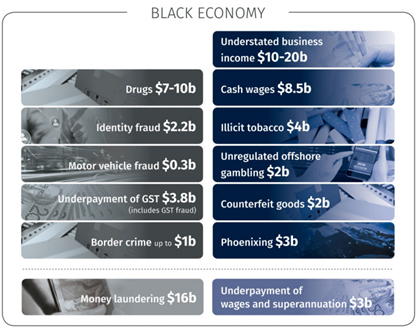 Partial indicators of black economy related activity. Source: Australian Parliament
Partial indicators of black economy related activity. Source: Australian Parliament
Be prepared that the rules can potentially expand to cover more tiers in supply chain, and more criteria may be added to prove a satisfactory STR (e.g. whether there have been convictions for phoenixing behaviour, bribery or corruption).
Sustainable procurement policies
“Most organisations spend between 40–80% of their financial resources across their supply chains.” -The Australian ISO 20400 Committee
Sustainable procurement has quickly become a key area of focus for many organisations, who have started to look for non-financial benefits that suppliers can deliver, such as social and environmental factors.
While currently, the world’s first sustainable procurement standard ISO 20400 is not a certification standard yet, that may very well change given the global trends and commitment towards the Sustainable Development Goals.
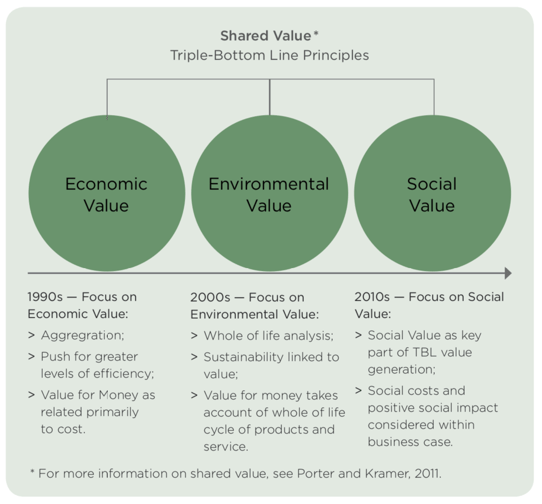 Shared value in procurement practice. Source: Social Procurement Action Group
Shared value in procurement practice. Source: Social Procurement Action Group
Closer to home, the Australian Government and public sector have been introducing legal frameworks around procurement to combat social issues such as forced labour, fair access to economic benefits for underrepresented social groups etc.
The introduction of Australia’s Modern Slavery Act
We have written about what this act entails here.
The Australian legislation takes a stronger stance on modern slavery than its UK counterpart, but weaker than the NSW Modern Slavery Act, which imposes fines of up to $1.1 million and has a lower revenue threshold for the reporting requirements.
Even if you don’t engage directly with government agencies, once the head contractors start asking modern slavery related questions of their suppliers, soon you may find yourself affected by the legislation.
Increasing targets for Indigenous procurement
Recently, the Government has reviewed its Indigenous Procurement Policy to increase the number of high value contracts won by Indigenous businesses.
In addition, from 1 July 2020, the participation targets will be mandatory in high value contracts across 19 industries (instead of the current 8), including:
- Mining and Oil & gas services
- Industrial production and manufacturing services
Re-examine your supply chain and start identifying or building relationships with Indigenous owned businesses, contractors, and subcontractors
Procuring with a purpose for social good
The Victorian Government is leading with its Social Procurement Framework (SPF) launched in 2018 which aims to normalise social procurement in government buying.
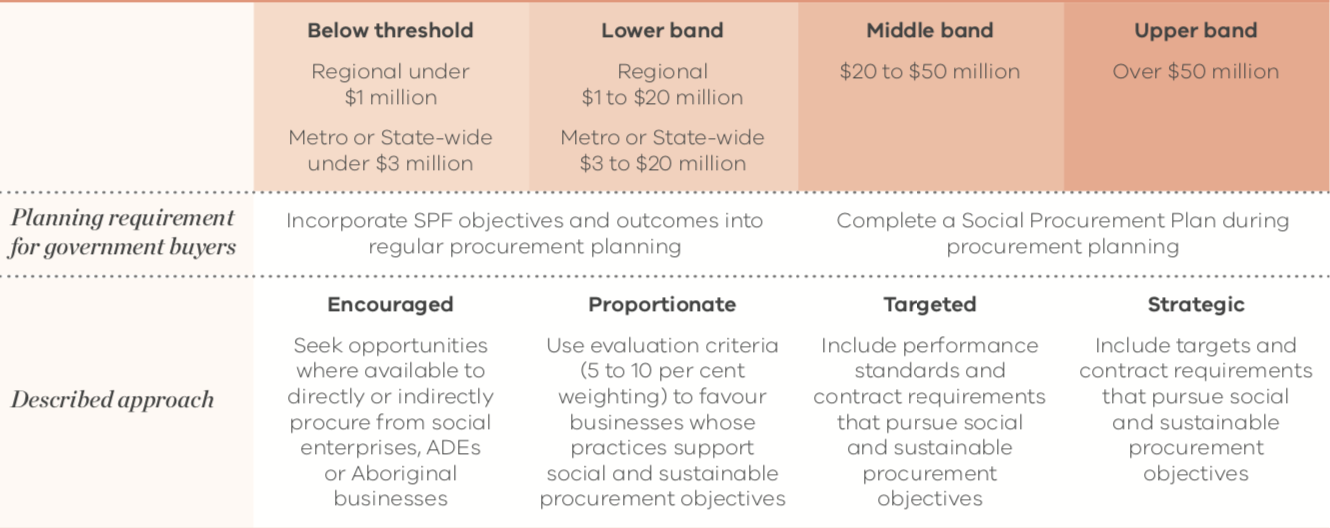 A snapshot of Victoria’s SPF requirements. Source: Victoria Government
A snapshot of Victoria’s SPF requirements. Source: Victoria Government
The impressive results from its inaugural annual SPF report (launched November 2019) can inspire other state/local governments, many of which already have guides around social procurement in place.
We have also written about the social procurement meaning & trend in a previous blog post.
Social Traders expects that by 2021 they’d facilitate $105 million in trade between buyers and Social-Traders-certified social enterprises.
Organisations can start reassessing their environmental, diversity, and employment policies & practices, as well as encouraging social value in supplier relationship management
The cost of non-compliance
Adopting sustainable procurement practices and ethics shouldn’t be a tick-box exercise. It should be the right thing to do. In other words, it’s not so much about avoiding fines as it is about not wasting your potential:
“If profitability is your sole purpose, you’re wasting the full potential of your intellectual capital to create a positive impact in the world.”
More immediate consequences
For other legislations or legal requirements, non-conformance could result in damage to individual or corporate reputation as well as imprisonment. In many cases, the impact can be across multiple tiers in the supply chain, and directors/business owners may find themselves in the deep end due to incidents caused by/to their subcontractors.
Financial consequences can come in the form of fines for breaching the law or in the form of revenue loss or lost opportunities.
For instance, the Queensland Government’s Ethical Supplier Mandate, which commenced this year, aims to introduce sanctions against suppliers failing to meet policy requirements.
“The Mandate will be expanded to include suppliers for other categories of spend, and agencies including statutory bodies, government owned corporations and special purpose vehicles, at dates to be determined in 2020.”
Notably, the onus is on suppliers to ensure downstream compliance, as they may be penalised for breaches committed by their subcontractors.
Beefing up your source-to-contract processes
The overall trend towards more stringent compliance requirements means there is a lot more to manage within the same timeframe. That said, the best defence is for procurement to take reasonable action to prevent possible breaches.
How do you ensure transparency and accountability in all activities throughout the procurement cycle?
- Having a procurement system in place that allows for an audit trail > demonstrate reasonable efforts to ensure risks are minimised
- Segregation of responsibilities or delegation of authority by implementing efficient workflows and defined access permissions to data
 Vendor prequalification:
Vendor prequalification:
- Start incorporating sustainability-related questionnaires to help sort your supplier database
- Doing the grunt work upfront by collecting compliance documents into a central repository with automated expiry notifications
Vendor performance evaluation during and post-engagement:
- Build weighted criteria to evaluate vendor performance across more dimensions
- Have past performance data centrally accessible for relevant teams, instead of keeping it buried in outdated spreadsheets
At the end of the day, prevention is better than cure when it comes to compliance risk. Organisations don’t need to wake up to a tragic death or hefty fine news story to spur themselves into action.
Interested in finding out about how Felix can help your organisation stay compliant through 2020 and beyond? Get in touch today!

Related Articles
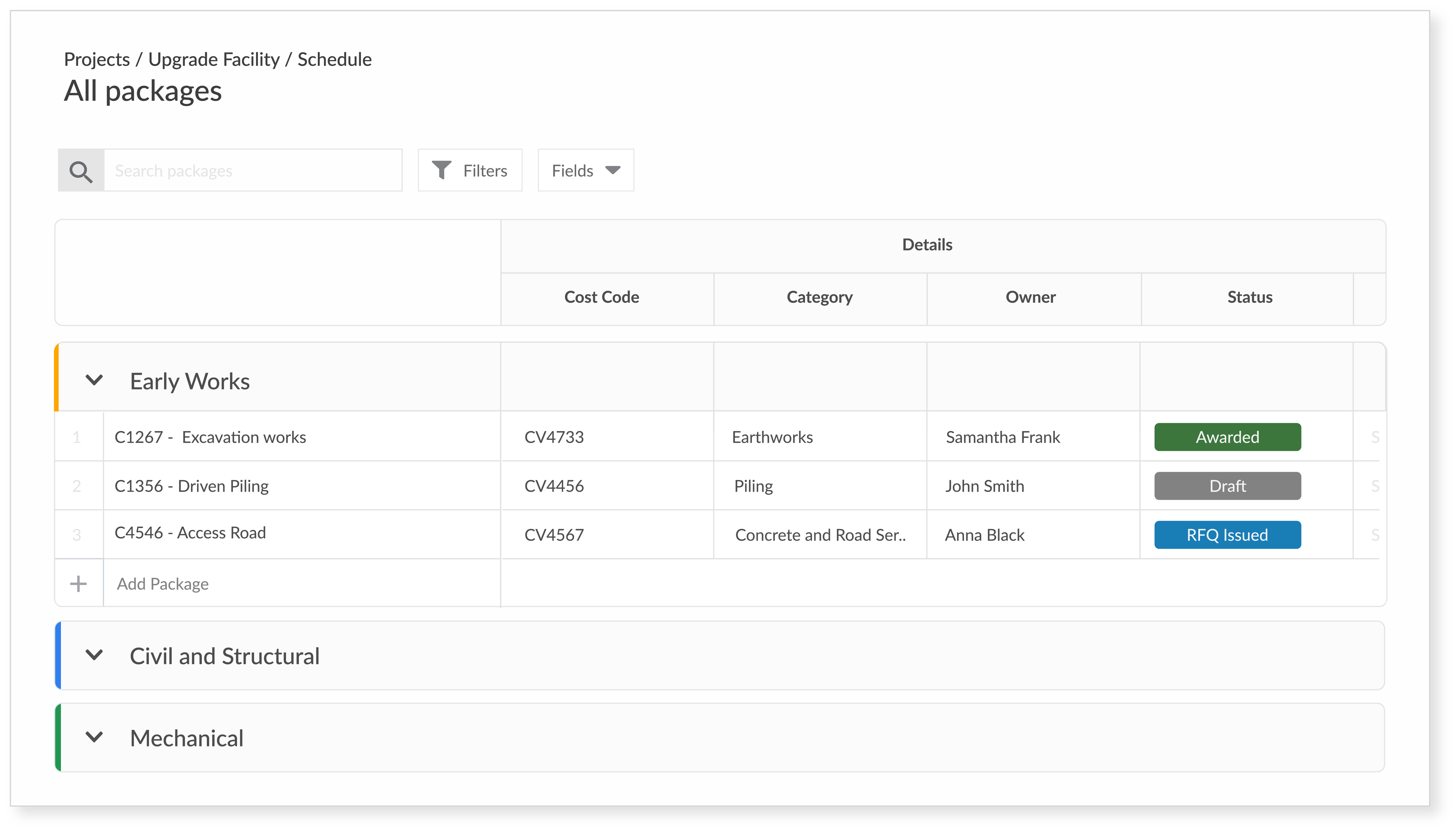
Webinar recap: Introducing Procurement Schedule
Recently, I had the pleasure of unveiling our latest module Procurement Schedule in our launch webinar. Below are the highlights of the session.

Building high-performance procurement teams
As talent shortages sweep through the construction industry and impact productivity, procurement is starting to feel the effects. Focusing on increasing the performance of your procurement team is important to delivering long-term outcomes.

Giving your procurement process & governance a health check
Procurement governance has never been a particularly exciting topic. Given increasing compliance requirements, procurement has given and been given a host of policies and guidelines to follow. But is it enough to mitigate procurement risks and ensure compliance?
Let's stay in touch
Get the monthly dose of supply chain, procurement and technology insights with the Felix newsletter.
